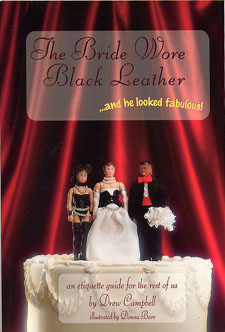
 |
The Bride Wore Black Leather (And He Looked Fabulous!)An Etiquette Guide for the Rest of Us |
Title: The Bride Wore Black Leather (And He Looked Fabulous!)
Author: Drew Campbell
Publisher: Greenery Press
Vital Stats: © 2000; trade paperback, 128 pp.; US$11.95
ISBN: 1890159174
Freak Nation Rating: ![]()
![]()
![]()
![]()
Buy It From: Powell’s Books
If you’ve ever had a sticky manners question not covered by the standards, like “How do I address an invitation to a poly group?”, “How do I find out if he’s doing drag, or transitioning?” or “How do I act around my former Master when I’m with my new one?”, you should read this book. If you’re the kind of person who regards etiquette as an outdated, inapplicable set of behavior rules that should be replaced with honesty, open-ness, and self-affirmation, you need this book. If you’re the sort who collects etiquette manuals, longs for the days when complete strangers weren’t presumptuous enough to use your first name, and regards Judith Martin and Quentin Crisp as personal heroes, you’ll really enjoy this book.
This book was written for what the author terms the “altsex” community — gay/les/bi/trans, fetish, leather, BDSM, poly, cross-dressers, and et cetera, with forays into commonly overlapping subsets such as Paganism and the sex industry. The author asked for questions on his Web site, and from the overwhelming response, culled examples to illustrate the basic principles of good manners and how they still apply even in our “alternative” lives.
 The author is well-grounded in the ways of all the subcultures he addresses; he is also (writing as Christina Abernathy) the writer of the well-regarded Miss Abernathy set of slave training manuals, and (as A. H. Dion) author of The Strap-On Book. He gives equal time and weight to “standard” etiquette topics, such as how to address invitations, and down-and-dirty queries like “How do I handle shit during (and after) anal sex?” that would make Emily Post blanch.
The author is well-grounded in the ways of all the subcultures he addresses; he is also (writing as Christina Abernathy) the writer of the well-regarded Miss Abernathy set of slave training manuals, and (as A. H. Dion) author of The Strap-On Book. He gives equal time and weight to “standard” etiquette topics, such as how to address invitations, and down-and-dirty queries like “How do I handle shit during (and after) anal sex?” that would make Emily Post blanch.
In “Context is Everything”, he discusses how etiquette varies with setting, from dungeon party to boardroom, and how the rules apply and vary. How do you properly introduce your multiple partners, and their partners? Do I hug when introduced? Do I introduce an exotic dancer by his stage or personal name? How do I act in a “mixed” gym? What do I do when my straight co-workers ask me what I did over the weekend? There’s also a lovely section on certain “local” problems of San Francsico, which are equally applicable to other situations, such as handling the flood of out-of-town guests some of us must fend off at Pride time. And although I don’t know what good it will do some of the readers, it warmed my heart to see the polite suggestion to the Castro boys that they should consider posing on the side of the sidewalk, instead of cruising at a snail’s pace and blocking traffic.
In the second chapter, “Define Yourself, Not Others”, the use and application of labels and terms of address are tackled, with the overwelming caveat that people should be addressed in the terms they prefer, and you should respect their preferences (and make your own preferences clearly available for their use). How does one handle fag-dyke sex and its frequent community backlash? What’s with all the lesbian potlucks? How does one handle having one’s “packer” fall down one’s pants leg in mixed company? (With grace and charm, and by emulating King Edward, who apocryphally caught up a lady’s lost garter at a ball, declared “Shame on he who thinks evil of it!”, and founded the Order of the Garter. And a speedy retreat, if one desires.) What’s the difference between intersexed and transsexual? And between pansexual and omnisexual? How do I tell if someone wearing a collar is “in the scene” or just a fashion victim? What’s the correct term — partner, boy/girlfriend, lover, SO, spouse? (The results were tallied, so you can find out what eveyone else thinks, but the author suggests you ask the person in question and use what feels best to both of you.)
In “Do Not Confuse the Public With the Private”, the agonizing problems of Too Much Information Syndrome and respect for privacy (yours and that of others) are dealt with wittily and usefully, from outing and unwanted gossip to dealing with exes. The response to a question concerning the partner of one’s partner who one happens to dislike suggests treating them cordially, and adding an air of great personal satisfaction and happiness — “Nothing drives people mad faster than the belief that someone else is really, truly happy”. There’s also a lovely, useful table of euphemistic titles for sex industry workers to use in the “straight” world — “on-site consultant”, “personal trainer”, “special events coordinator”, et cetera. There’s a long section on dealing with persons whose therapy is infringing upon your personal comfort, and a translation table from “therapy-speak” back into English, for those of us who are sick of persons who “have issues around their stuff”.
The book also handles those people you’ve always wanted to slap with an etiquette book. The overbearing would-be top who thinks their macho/a manner will instantly transform you into a slave? The queers who openly boycott their friends’ weddings, too insulted by your “het privilege” to wish you happiness? Rude clients of sex workers? All put in their place. There are reminders of What No Polite Person Discusses in Public, and how to deal with bigots, jerks, and other offending persons without stooping to their level.
“Consider Others Before You Speak or Act” reminds us that the right to self-expression does not preclude politeness, and how to handle the well-intentioned but misinformed, the clueless, and the outright boors among friends, family, co-workers, and total strangers on the street who ask us those questions (“Have you had the penis sewed on yet?” “Does your girlfriend like you even though you’re fat?” “Aren’t you bisexuals really just gay?”). Drew also takes on the current misapprehension that radical honesty is a social virtue, and reminds us instead of the polite fiction, and of considering others’ feelings above our own, before once again going after those who are disgusted with our orientation, fundamentalists, and the generally abusive.
“Play Nice or Get Out of the Sandbox” addresses host and guest behavior, special events (from dungeon to wedding to funeral), dating (the single, the polyamorous, the BDSMer, the allergic), one-night stands (“Do I have to offer breakfast? How do I get them to leave?”), to breaking up. There’s a reminder of proper behavior of party and house-guests, as well as hosts, including protocol for in-house live-in slaves. The etiquette of sex parties is covered briefly but fairly completely, with a reminder that house rules always apply. There are techniques for dealing with parties you wish you hadn’t attended, such as an unemployable friend’s third rent party in three months, parties where the guests are expected to pay for the entertainment, or a coworker’s unadvertised-as-such “Fuckerware” sex-toy-sales party. The Big Events — pregnancies and new babies, weedings and commitment ceremonies, and deaths and funerals are covered with equal usefulness to host, guest, and persons-of-honor. While by no means a complete guide to the alternative wedding (which other books have attempted to take on), it’s a good general overview, which I intend to keep handy for impending non-traditional weddings in my family.
The book is peppered with quotes from the online respondents as well as antique greats of the etiquette scene, such as Quentin Crisp and Lord Chesterfield, which bring the object lessons further home. If I ever decide to out myself to anyone again, I may simply xerox the relevant questions and responses and mail them to someone, along with a polite letter informing them of my status. While the chapter titles do not make it immediately obvious where one can find advice on a specific topic, the index is fairly complete. The book is cheering and useful to us altsexers, who are the target market, but much of this advice will be useful to one’s family, co-workers, and friends as well. And it’s fun to read. Highly recommended.
Ms. Alternative Manners is a biker-jacket freak lady who has dedicated herself to the advocacy of good manners. She writes an ongoing manners and advice column for Freak Nation, in which she teaches that politeness is to human interaction as lube is to sex. It may not be strictly necessary, but it makes things a great deal less painful, more comfortable, and more fun, especially for large groups, first meetings, unusual situations, and special occasions. You can send her questions for that column at advice (at) freaknation ( daht ) com.